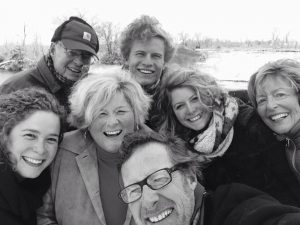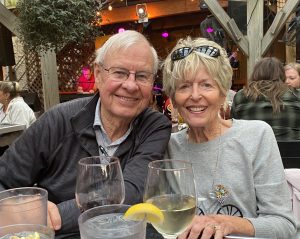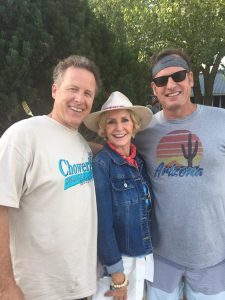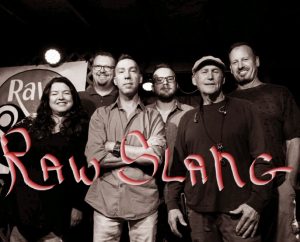
Take daughter Melanie Ross Brown, a graduate in Sociology from UNL, a social worker at Madonna, and then moving to Phoenix teaching Jazzercise while mothering three sons; and providing Mom and Dad a winter hangout! “She and I are the listeners,” her mother Jeanne told me.
That’s undoubtedly true, the arts need audiences, but it is also unduly modest. Jeanne for instance. A graduate of Grinnell College and KSC, Jeanne was NTV’s host and producer of news and public affairs programming. Many a weary actor, after a late rehearsal the night before, woke early to appear on a show Jeanne co-hosted that touted what was going on in Kearney, touted arts and culture and society. She co-hosted with Linda Johnson, married to the then station manager at NTV, Jim Johnson, so their program had more than the usual morning talk show clout. That was before she taught speech and coached forensics at UNK, which was before she co-founded Curtis and Associates, all before retirement set her to being a fund-raiser and docent for MONA!
If that’s “just listening,” then we need a whole lot more listeners!
Co-founding must run in the family. Son John co-founded the musical group Raw Slang, the name a combination in sound of Ross and Lang, for Josh Lang the other co-founder. Together, they perform with Karen Lee, Brian Botsford, Greg Tesdall, and Logan Hansen. For John, Raw Slang came along after graduation from Nebraska Wesleyan, where he was a Hall of Fame runner, then served as a National Consultant and speaker for Curtis and Associates, Inc, and teaching and coaching for the Lexington Public Schools. He also survived one of Chuck Peek’s night classes!
Brother Phip Ross did Chuck the honor of sending him a packet of his poems to enjoy and comment on, wonderful work that deserves to see the light of day. Phip turned out those poems while chairing the program in developmental English at Southeast Community College and playing his guitar.
“Counting to One”
The Poet who counts leaves
Dropping in the forest every fall.
On a little notebook
Plucked from the pocket
Of a thinning sweater
Stands watch like the many before.
The leaf of alder, dogwood, cottonwood–
Each a mouth of flame in the eye, the twirl
Eddy on the surface of the stream
Above the doddle of a trout.
Count poetic slows
Before “two” or “three”–the hinge holds
In silent tremolo of
What what is scribbled about just one.
This the poet cups. Even the black pine stills
Its breath with the cloud against the cliff
In the wet silence of one, perhaps the only, or the last
Leaf-fall.
~ Phip Ross
Let’s see, that leaves? Oh yes, Bill. The short blurb on the back of his book Growing Up in Gibbon tells us that Bill Ross graduated from the University of Nebraska in Lincoln in 1957 with a Bachelor’s degree in Journalism. And went on to graduate from Creighton University with a law degree, and admitted to the Nebraska Bar in 1961. Since then, he has been engaged in the private practice of law in Kearney, serving at one time as the attorney for the university.
From Bill’s book Light Verse and Poems
“Sad Memory”
You could see the specter of the Great Depression
deep in my father’s eyes like a brooding cloud
the scar tissue of dark memories
dust drifting in fence lines
like warm snow
creditors as voracious as grass hoppers
the hopelessness of endless drought and
the haunting, the ultimate fear:
losing the Land
He never spoke of those dusty days
but when his eye lost its twinkle and
his gaze fixed on the western skyline
I knew he was reliving
that unspeakable sadness.
(1979)
Beyond his training in journalism, I don’t know where Bill picked up his skills at creative writing, but they are so evident in this poem. The specter and the voraciousness of the creditors extend the lines outward, their emotional effect noted in the dwindling lines that follow, the scar too deep for words but not buried so deeply it was not visible, not relived. “Scar” stories are among our most important stories. I used to ask my students to write them, about themselves which they found hard, about members of their family, which came more easily. Our traumas are part of the legacy we pass on when we pass, something at the heart of our humanity. That’s what Bill captures here.



